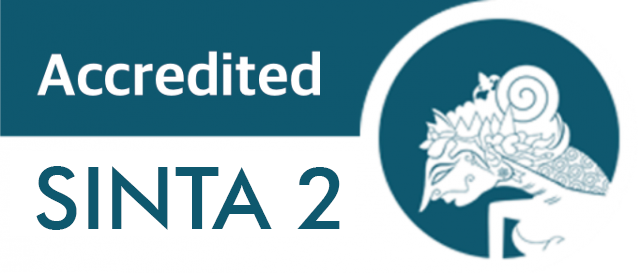Mathematical Problem-Solving Ability in STAD Learning Assisted by Question Cards in Terms of Student Learning Motivation
DOI:
https://doi.org/10.18326/hipotenusa.v6i1.1956Keywords:
learning motivation, mathematics problem-solving ability, question cards, STADAbstract
This research aims to determine the effectiveness of Student Teams Achievement Division (STAD) learning model assisted by question cards and description of mathematical problem solving ability in terms of students' learning motivation using STAD learning model assisted by question cards. The method used in this research is mixed method with sequential explanatory design. The subjects in this research were 6 people consisting of 2 students in each learning motivation category, namely high, moderate, and low. The results of this research showed that: (1) the mathematical problem-solving ability of grade VIII students after participating in STAD learning assisted by question cards on Probability material reaches learning completeness; (2) The average mathematical problem-solving ability of grade VIII students after participating in STAD learning assisted by question cards is higher than the average mathematical problem solving ability of grade VIII students who use conventional learning models; (3) The completeness of mathematical problem-solving ability of grade VIII students after participating in STAD learning assisted by question cards is more than the proportion of completeness of mathematical problem solving ability of grade VIII students using conventional learning models; (4) Subjects with high learning motivation fulfil all four indicators of mathematical problem-solving ability well. Subjects with moderate learning motivation fulfilled 3 indicators of mathematical problem-solving ability well.
References
Anisah, & Lastuti, S. (2018). Pengembangan Bahan Ajar berbasis HOTS untuk Meningkatkan Kemampuan Pemecahan Masalah Matematis Mahasiswa. Kreano: Jurnal Matematika Kreatif-Inovatif, 9(2), 191–197.
Antika, R. (2019). Peningkatan Motivasi Belajar Matematika Melalui Pembelajaran Matematika Kontekstual. Jurnal Pemikiran Dan Penelitian Pendidikan Matematika, 2(2), 130–141.
Ariani, T., & Agustini, D. (2018). Model Pembelajaran Student Team Achievement Division (STAD) dan Model Pembelajaran Teams Games Tournament (TGT): Dampak terhadap Hasil Belajar Fisika. Science and Physics Education Journal (SPEJ), 1(2), 65–77. https://doi.org/10.31539/spej.v1i2.271
Arifin, Moh., & Halim, M. L. Al. (2021). Cooperative Type Number Head Together (NHT) with Question Card Media in Learning Tenses. KARANGAN: Jurnal Kependidikan, Pembelajaran, Dan Pengembangan, 03(01), 44–50.
Atiaturrahmaniah, & Fajri, N. (2020). Using fractional card media and math games to increase students’ activities and learning outcomes. Journal of Physics: Conference Series, 1539(1). https://doi.org/10.1088/1742-6596/1539/1/012070
Baier, F., Decker, A. T., Voss, T., Kleickmann, T., Klusmann, U., & Kunter, M. (2019). What makes a good teacher? The relative importance of mathematics teachers’ cognitive ability, personality, knowledge, beliefs, and motivation for instructional quality. British Journal of Educational Psychology, 89(4), 767–786. https://doi.org/10.1111/bjep.12256
Creswell, J. W. (2018). Research Design – Qualitative, Quantitative, and Mixed Methods Approaches (Fourth Edition). Sage Publication Inc.
Fatimah, A. E. (2020). Upaya Peningkatan Kemampuan Pemecahan Masalah Matematis Siswa Mts Melalui Model Pembelajaran Kooperatif Tipe Stad. Journal of Didactic Mathematics, 1(1), 33–40.
Fatra, M., Darmayanti, R., & Dhakal, A. (2023). A Study that Uses Card Based Learning Media to Help Students’ Mathematical Literacy. Jurnal Pendidikan Matematika, 1(2), 91–98. https://doi.org/10.61650/dpjpm.v1i1.277
Fitriawan, D., Siregar, N., & Sulistyowati, E. (2023). Learning Design for Combinatorics with Realistic Mathematics Education (RME) Approach. Hipotenusa: Journal of Mathematical Society, 5(2), 109–120. https://doi.org/10.18326/hipotenusa.v5i2.290
Gultom, F. J., & Simorangkir, F. M. (2023). Penerapan Model Pembelajaran Kooperatif Tipe Student Teams Achievement Division (STAD) Untuk Meningkatkan Kemampuan Pemecahan Masalah Matematis Siswa Sma Swasta St. Antonius Bangun Mulia. Jurnal Sains Student Research, 1(2), 3025–3986. https://doi.org/10.61722/jssr.v1i2.133
Halean, S., Kandowangko, N., & Goni, S. Y. V. I. (2021). Peranan Pendidikan dalam Meningkatkan Sumber Daya Manusia di SMA Negeri 1 Tampan Amma. Jurnal Holistik, 14(2), 1–15.
Järvenoja, H., Järvelä, S., & Malmberg, J. (2020). Supporting groups’ emotion and motivation regulation during collaborative learning, Learning and Instruction. Learning and Instruction, 70.
Muhaimin, L. H., & Juandi, D. (2023). The Role of Learning Media in Learning Mathematics: A Systematic Literature Review. Journal of Mathematics and Mathematics Education, 13(01), 85–107. https://doi.org/10.20961/jmme.v13i1.74425
Nada, L. Q., Salsabila, W. T., & Susilawati, S. (2020). Efektivitas Pembelajaran STAD Berbantuan Kartu Soal pada Materi Komposisi Fungsi untuk Menumbuhkan Literasi Matematika. Seminar Nasional Pendidikan Matematika, 293–300.
Natow, R. S. (2020). The use of triangulation in qualitative studies employing elite interviews. Qualitative Research, 20(2), 160–173. https://doi.org/10.1177/1468794119830077
NCTM. (2000). Principles and Standards for School Mathematics: Vol. Vol. 4, Issue 1. Reston: The National Council of Teachers of Mathematics.
Novianti, C., Sadipun, B., & Balan, J. M. (2020). Pengaruh Motivasi Belajar Terhadap Hasil Belajar Matematika Peserta Didik. Science, and Physics Education Journal (SPEJ), 3(2), 57–75. https://doi.org/10.31539/spej.v3i2.992
OECD. (2015). Results in Focus What 15-year-olds Know and What They Can Do with What They Know.
Raskind, I. G., Shelton, R. C., Comeau, D. L., Cooper, H. L. F., Griffith, D. M., & Kegler, M. C. (2019). A Review of Qualitative Data Analysis Practices in Health Education and Health Behavior Research. In Health Education and Behavior (Vol. 46, Issue 1, pp. 32–39). SAGE Publications Inc. https://doi.org/10.1177/1090198118795019
Rigusti, W., & Pujiastuti, H. (2020). Analisis Kemampuan Pemecahan Masalah Ditinjau Dari Motivasi Belajar Matematika Siswa. Prima: Jurnal Pendidikan Matematika, 4(1), 1.
Rohmah, M. Y., Nuraini, N. L. S., & Linguistika, Y. (2019). Pengembangan Media Pembelajaran Pancakar (Papan Pecahan dan Kartu Soal) dengan Penguatan Karakter Rasa Ingin Tahu Siswa Kelas IV Sekolah Dasar. JPM : Jurnal Pendidikan Matematika, 5(2), 139–158. https://doi.org/10.33474/jpm.v5i2.2725
Salam, M. Y. , Mudinilllah, A., & Agustina, A. (2022). Aplikasi Quizizz Berpengaruh Atau Tidak untuk Meningkatkan Motivasi Belajar dan Hasil Belajar Siswa. Jurnal Basicedu, 6(2), 2738–2746.
Saputra, H. (2022). The Effect of Using Geogebra Assisted STAD Type Learning Model on Problem-solving Ability and Mathematical Disposition. Al-Madrasah: Jurnal Pendidikan Madrasah Ibtidaiyah, 6(3), 574. https://doi.org/10.35931/am.v6i3.1028
Simanjuntak, E. (2021). Penggunaan Metode Pemecahan Masalah (Problem-solving) Untuk Meningkatkan Hasil Belajar Pada Pelajaran Matematika Kelas IX SMPN Kecamatan Gunung Meriah Semester Ganjil Tahun Ajaran 2021/2022. Journal Ability : : Journal of Education and Social Analysis, 2(1), 164–172.
Sugiyono. (2013a). Metode Penelitian Kombinasi (Mixed Methods). Alfabeta.
Sugiyono, D. (2013b). Metode penelitian pendidikan pendekatan kuantitatif, kualitatif dan R&D. Alfabeta.
Sya’adah, U., Sutrisno, & Happy, N. (2023). Efektivitas Model Pembelajaran Teams Games Tournament (TGT) Berbantuan Kartu Soal terhadap Minat dan Hasil Belajar Siswa. AKSIOMA: Jurnal Matematika Dan Pendidikan Matematika, 14(2), 147–158.
Waritsman, A. (2020). Hubungan Motivasi Belajar dengan Prestasi Belajar Matematika Siswa. Jurnal Penelitian, 2(1), 28–32.
Wijaya, H., & Arismunandar, A. (2018). Pengembangan Model Pembelajaran Kooperatif Tipe STAD Berbasis Media Sosial. Jurnal Jaffray, 16(2), 175.
Downloads
Published
How to Cite
Issue
Section
License
Copyright (c) 2024 Mulyono Mulyono, Amira Sulkha Fatika

This work is licensed under a Creative Commons Attribution-NonCommercial-ShareAlike 4.0 International License.

This work is licensed under a Creative Commons Attribution-ShareAlike 4.0 International License.






